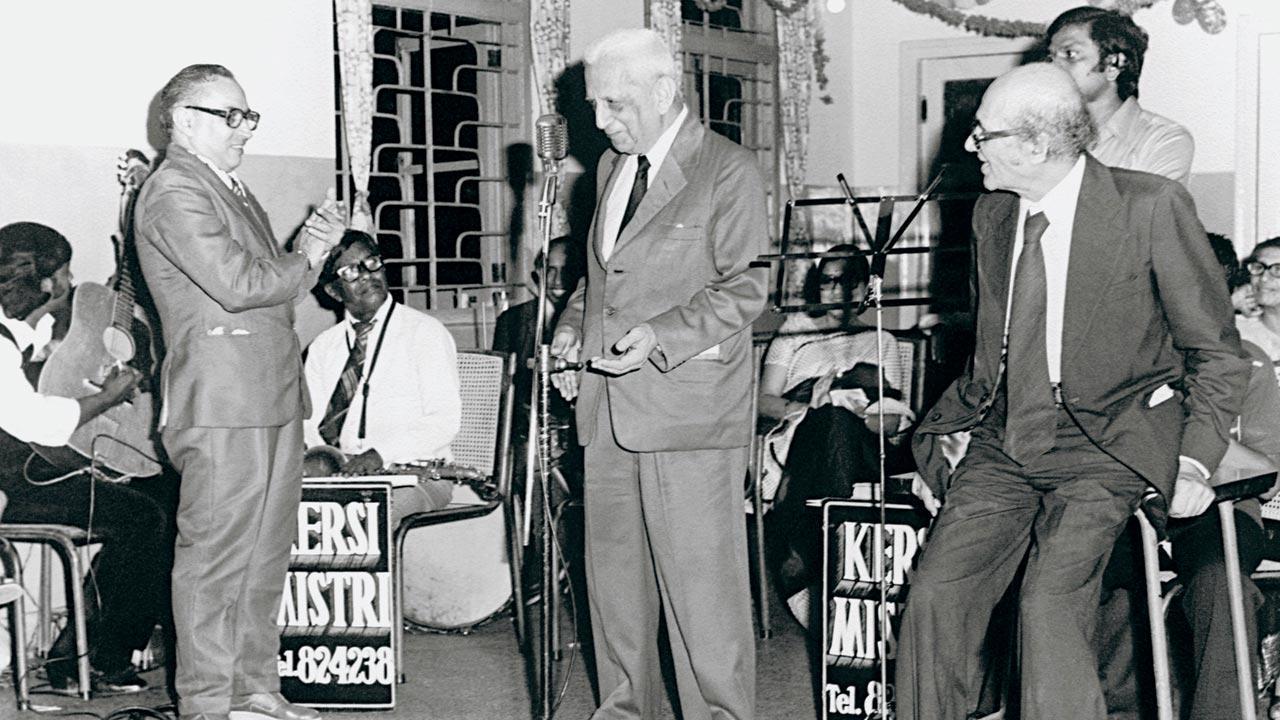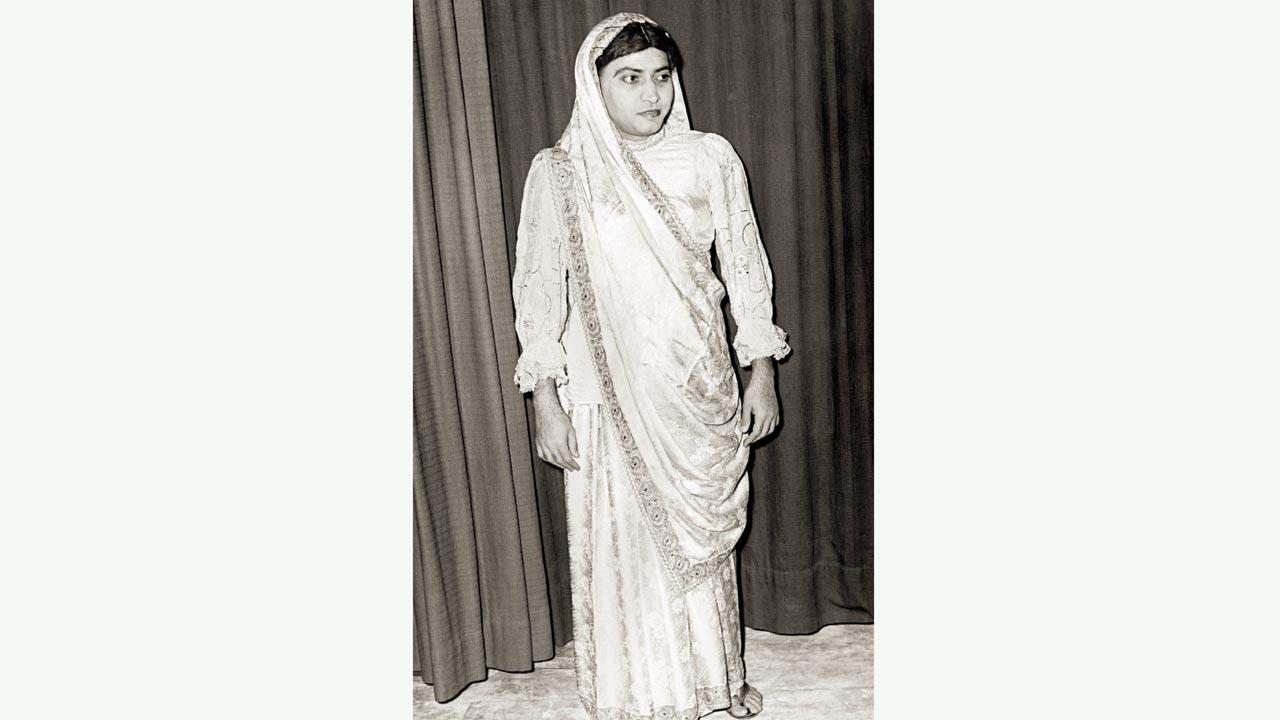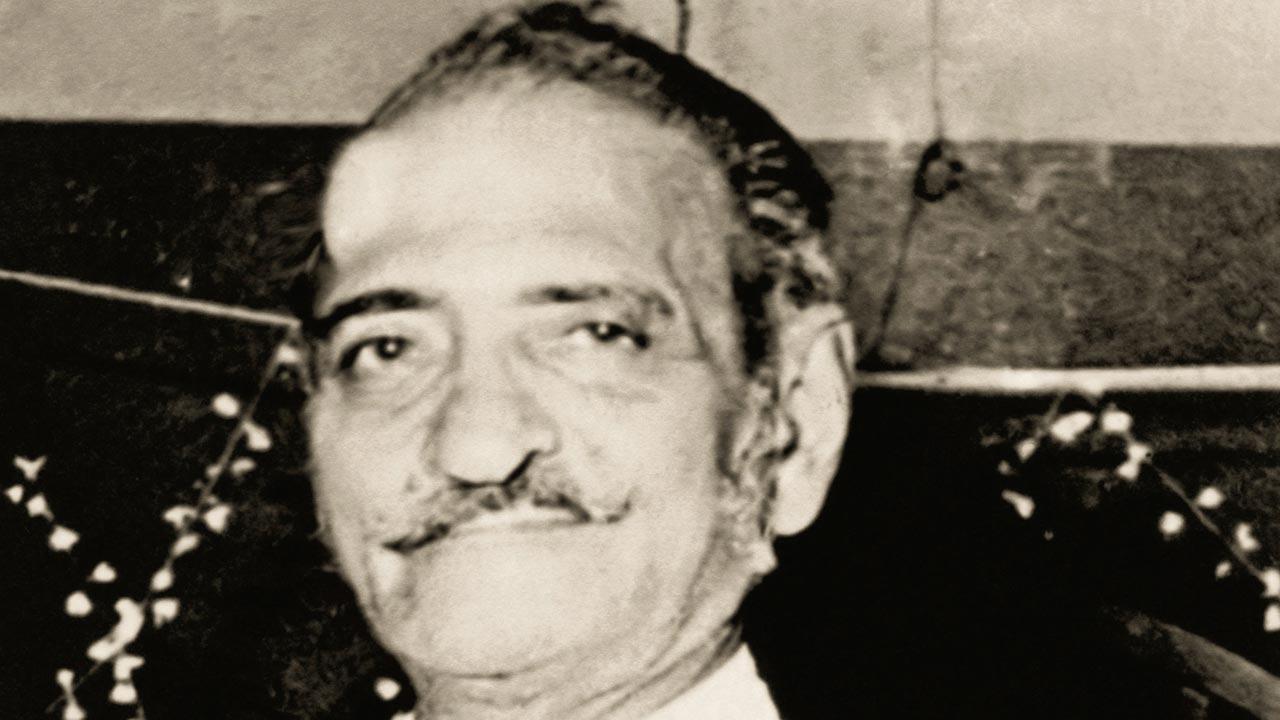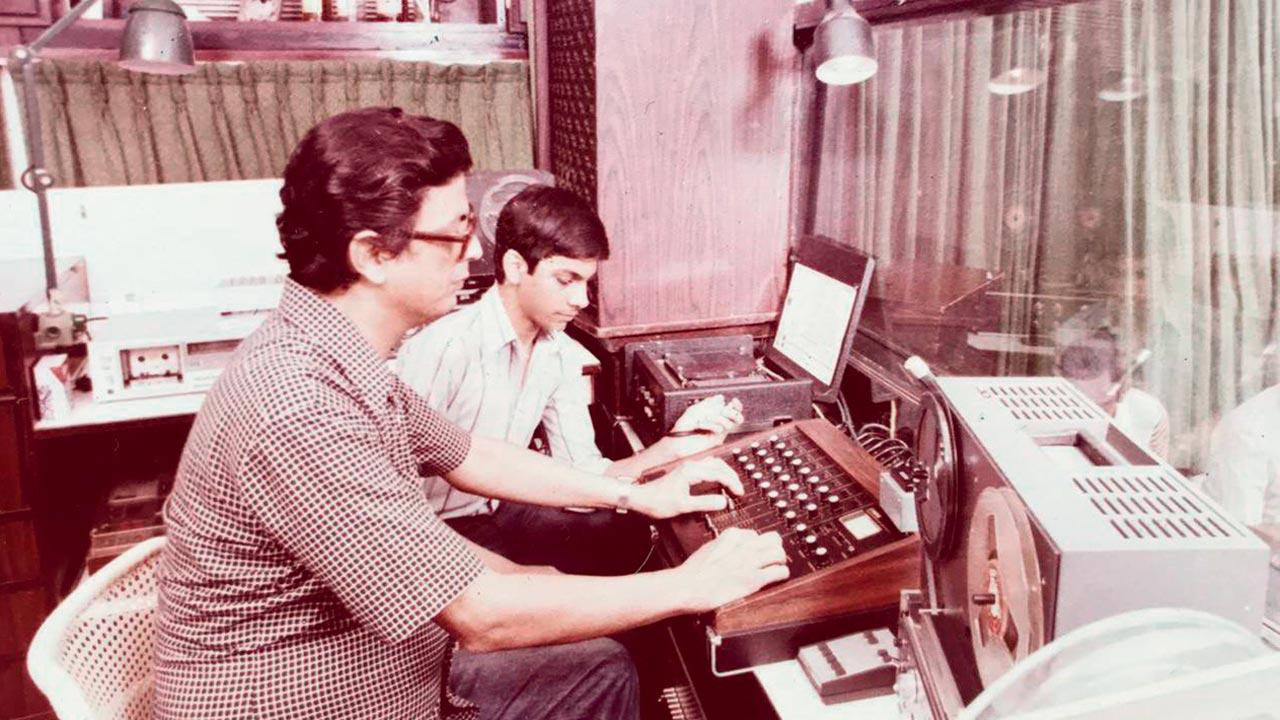Parsi naataks miss the rich sonic texturing lent by the late greats, Kersi Mistry, Dara Mehta and Sarosh Bhabha

Music director Kersi Mistry (extreme left) in rehearsal with members of his troupe. Pics Courtesy/Meher Marfatia, Laughter in the House: 20th-Century Parsi Theatre
 Their repertoire has gone largely undocumented, more’s the pity. As we gear up expectantly for another welcome New Year’s night of naataks enjoyed on stage, after punishing seasons of online viewing, it’s time to offer tribute to a trio of music men. Pepping up the plays of 20th-century Parsi dramatists in very different ways, each has left a deep and distinct impression.
Their repertoire has gone largely undocumented, more’s the pity. As we gear up expectantly for another welcome New Year’s night of naataks enjoyed on stage, after punishing seasons of online viewing, it’s time to offer tribute to a trio of music men. Pepping up the plays of 20th-century Parsi dramatists in very different ways, each has left a deep and distinct impression.
ADVERTISEMENT
HMV’s blue-eyed boy from the 1950s, Kersi Mistry composed piano notes for film song recordings with the same consummate ease and adeptness that he brought to stage histrionics. Devising dramatic tracks for naatak nights was as much a pleasure for the virtuoso as acting.

Mistry playing a woman’s role in a play
Collecting photographs from the families of these music makers, as part of my research for a book on Parsi theatre, I looked—and then looked again—at a particular print. The “lady” wearing an embroidered kor-bordered sari, with the traditional sor draped on her right shoulder over a long-sleeved blouse, was none other than Kersi Mistry. Relied upon to substitute any actor or actress who failed to show up for a farce whose notes he was scoring, the music director would slip behind the curtain to emerge as that character and return to conduct his orchestra—all in marvellously swift, smooth transition.
It was the age of singing stars, and Mistry had melody in his genes. The son of Phirozshah Mistry (credited with music direction of classic blockbusters like the first talkie, Ardeshir Irani’s Alam Ara), he sang as well as played the piano and harmonium competently. A tabalchi in his father’s orchestra suggested the boy learn the Indian instrument for a start. Later a self-taught keyboard and accordion player, Mistry cut records with bandleader Goody Seervai and hit jingles for HMV.

Dara Mehta, prolific composer of lyrics
Growing up near the vibrant Pila House district, Mistry was a regular member of the audience watching social melodramas. Phirozshah had travelled to Rangoon with a drama troupe. The proprietors and performers of Baliwalla Theatres were known to the Mistrys. Munnibai, their famed actress, appreciated his musical accompaniment and encouraged him to familiarise himself with serious plays. Back in the day, those typically brimmed with declamatory acting in maudlin romances or exaggerated blood-and-thunder finales of epics, including Firdausi’s tragedy of Rustam and Sohrab from the Persian 10th-century Shahnameh.
So it was that several theatrical strands wove together to influence Kersi Mistry’s formative years. The acclaimed playwright Pijam (Pherozeshah Jehangirjee) Marzban, father of Adi Marzban, was a family friend of the Mistrys. Their Transvaal Terrace home rang with sounds of late evening rehearsals and concerts stretching all night. Impressed with his aptitude, once HMV employed Mistry as a pianist, he began rubbing shoulders with Talat Mahmood, Manna Dey, Mohammed Rafi, Mukesh and Lata Mangeshkar.

Sarosh Bhabha in the studio room with his son Kaizad
But Mistry stayed immensely attached to the stage. Stacks of sepia-tinted albums, vintage medals and coins honour his contribution to 1950s-’60s plays celebrating silver jubilee runs. A delightful audio clip fortunately still doing the rounds has Adi Marzban himself preface a medley sung by Mistry’s ensemble, announcing “sar-avsar na Parsi geet” presented by “jaaneeta sangeetkaar Kersi Mistry, madhur awaaj ni Jaloo Bhesania neh elok no chorus group.”
Though not all his lyrics have instant recall today, the tinkling tunes of Dara Mehta, father of veteran actor Pervez Mehta, once totally lit up the productions of Minoo Nariman, Pheroze Antia and Marzban. At the Tata Theatre performances of Khushi Khushali, a revue of Dara Mehta’s lilting numbers staged for Navroze a few years ago, not many listeners traced these back to theatre.
The lyricist of around 1,200 songs for Parsi Gujarati plays between the 1940s and the 1970s, Mehta spent his childhood around Khetwadi. That was close to the thrill and thrall of every spectacular show unfolding before his young eyes. Skimping and saving to buy five-anna tickets, he gave himself up to the magical whirl of musicals. Mehta soon realised he was restless consigned to waiting on customers in the sandalwood shop where he was employed, opposite Cama Baug Agiary. He turned heart and mind to where they belonged: the colourful world of music and drama.
In the heyday of this theatre of the 19th and early 20th century, troupes owned by Parsis and featuring a cosmopolitan mix of actors held grand shows across the country. When silent films graduated to the talkies in the 1930s, there were fewer takers for stagecraft. To revive Parsi Gujarati theatre, producers strategically enlivened their productions with the insertion of popular ditties.
Staunchly invested in old plays, Mehta saw this as both chance and challenge. He scripted songs for Baliwalla Theatres’ Khuda ne Manzoor, Karmaayla Phool, Chhatti na Lekh and Maay ni Mamta. For Jhupri nu Jhaver he had to overnight churn out a dozen songs, some comic, some serious. An instantly catchy hit was Mara Mara Sam, about a man swearing equal devotion to four women.
Apart from sparkling original compositions, Dara scored fresh lyrics for film numbers by Kishore Kumar and chartbusters from Raj Kapoor movies. The Darling Orchestra, which played under his baton for wedding and Navjote parties, carried on being conducted by his son Marazban Mehta. As Sam Kerawalla, who directed Khushi Khushali, says, “He wrote for anybody who wanted a song.”
Kerawalla recalls another dear friend, Sarosh Bhabha, who was insatiably curious about all things sonic ever since he wondered which wires went where with Grundig recorders set up for an early-1960s Marzban variety revue at Bharatiya Vidya Bhavan. The man behind evocatively layered music compilations in the foremost Gujarati and English plays for over half a century, Bhabha, with his son Kaizad, treated at least two generations of audiences to soundscapes which were always unique.
A drama critic of a national daily, lost for the name to mention for music credits of the Indian National Theatre (INT) play Lafra Sadan, said to herself, “It’s got to be Sarosh Bhabha.” On checking, it was indeed him. With his son Kaizad, he created a rich audio landscape that served to smoothly propel plots of every genre, from farce to whodunit.
The son of the singer and stage manager Minoo Bhabha, Sarosh started experimenting with his metier from his Lamington Road flat where a room doubled as studio. He trained as an apprentice with sound engineer Minoo Katrak at Film Centre in Tardeo. Among the first plays he worked on were written by Adi Marzban’s brother Rustom (Lulu). He scored the music for Rustam’s wife Mitha Marzban’s dance shows too.
From 1965 he worked with choreographer Jeannie Naoroji on her fashion shows. “Sarosh and Kaizad’s talents are irreplaceable,” she had said. “The way they chose music, understanding genres from European classical to modern jazz, beautifully matched the mood and model walking to it. With Kaizad I saw a spark rare in a child his age and knew this was his forte.” As a schoolboy not quite eight, Kaizad expressed a keenness to assist his father. He rarely fell asleep on being sent to bed. Artistic discussions humming through the hallway kept him awake. Veterans such as Marzban, Burjor Patel, Dinyar Contractor, Jimmy Pocha and Kerawalla, with INT directors and technical specialists dropped in late night, after rehearsals.
“It was a privilege growing up with these fantastic personalities,” says Kaizad. “They taught theatre kids a whole lot about excellence and attitude. My father’s influence was tremendous. He would compile, so very thoughtfully and skillfully. I handled more on the production side. Dad introduced me to every kind of music composed. The just-right embellishment innovatively used is critical to the action of a play.”
Kaizad cites two INT examples as “true sonically textured productions”. The murder mystery, Hello Inspector, was one such. The haunting power of a piece like Stravinsky’s Rite of Spring, with its irregular metre and dynamic scales, drove the nail-biting suspense in Solmi January ni Madhraate—adapted from Ayn Rand’s courtroom thriller, Night of January 16th.
Sarosh Bhabha enriched his repertoire with artistes of the stature of Pandit Ravi Shankar and Pankaj Udhas, touring America and Russia with them. But experimenting with sound for theatre was what he found most gratifying. He was as proud to be associated with plays staged for charity by the city’s leading doctors who formed the Parsi Medical Amateurs group—“We were all in it together. If it was a Sunday in Bombay, people were at the theatre. Our work never felt like work. It was fun and learning with your best friends.”
Author-publisher Meher Marfatia writes fortnightly on everything that makes her love Mumbai and adore Bombay. You can reach her at [email protected]/www.meher marfatia.com
 Subscribe today by clicking the link and stay updated with the latest news!" Click here!
Subscribe today by clicking the link and stay updated with the latest news!" Click here!







